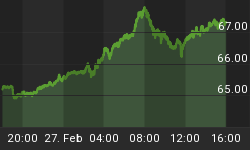Here are excerpts from recent commentaries posted at www.speculative-investor.com.
Don't fight the Fed?
"Don't fight the Fed" is an adage that's always worth remembering; however, this adage shouldn't be applied to all of the Fed's endeavours because the Fed is powerful in some areas and impotent in others. For example, the Fed can ALWAYS depreciate the US dollar -- that is, it can always cause dollar-denominated prices to rise -- if it chooses to do so, but it can't create real economic growth or sustainable employment (despite the fact that achieving "full employment" is part of the Fed's official mandate). Furthermore, although the Fed can always bring about a rise in prices by inflating the currency supply, it can't control which prices rise the most in response to its monetary inflation. In fact, the price-related effects of the Fed's inflation will often be the opposite of what the Fed intends.
Given that the Fed is always capable of creating inflation (in all meanings of the term), it is important not to bet on deflation at those times when the Fed is going 'full steam ahead' along the inflation path. Putting it another way, it doesn't make sense for investors to worry about deflation as long as the Fed is aggressively trying to promote inflation. By the same token, investors should generally become more concerned about the potential for deflation at those times when the Fed's top priority is to temporarily curtail the inflation.
Whereas it generally won't make sense to bet against the Fed's power to inflate, it will always make sense to bet against the Fed's ability to bring about real economic progress. This is because the Fed's manipulations of interest rates and money supply make the economy less efficient than it would be in the absence of these manipulations. It is also appropriate to bet against the Fed's ability to smooth-out the business cycle, because the central bank is one of the two main causes of large swings in the overall economy (fractional reserve banking being the other).
Summing up, the old adage "don't fight the Fed" always applies when it comes to inflation/deflation and never applies when it comes to real economic progress or economic stability.
Another nail in the coffin of the deflation argument
In the article posted HERE, Robert Murphy explains that earlier this year the Fed implemented a change in its accounting. On the surface the change appeared to be trivial. In fact, it was promoted by the Fed as being nothing more than a small step towards greater transparency. However, it has since become clear that this seemingly innocuous bookkeeping adjustment makes it impossible for the accounting value of the Fed's assets to fall below the accounting value of its liabilities; that is, it makes it impossible for the Fed to become technically insolvent.
The accounting change in question involves the offsetting of changes in assets by an equivalent change in liabilities, such that an $X increase or decrease in the total market value of assets will now automatically be offset by an $X increase or decrease in an item on the liability side of the Fed's balance sheet called "Interest on Federal Reserve notes due to the Treasury". Of primary importance, in the case where the Fed's assets decline in value the aforementioned item would be a negative number. For example, if the Fed's assets were to suddenly fall in value by $1 trillion, as a result of the recently-implemented accounting change the capital shown on the Fed's balance sheet would remain intact because the $1T decline in assets would be offset by inserting a negative $1T liability. Ben Bernanke may well be a terrible economist, but time and time again he proves to be a master of financial legerdemain.
Concerns about the health of its balance sheet were never likely to prevent the Fed from inflating the money supply if more inflation was deemed desirable, but in the unlikely event that balance-sheet health was a limiting factor in the past the above-mentioned accounting change will ensure that it won't be in the future. This means that another nail has been driven into the coffin of the deflation argument.
We aren't offering a free trial subscription at this time, but free samples of our work (excerpts from our regular commentaries) can be viewed at: http://www.speculative-investor.com/new/freesamples.html















